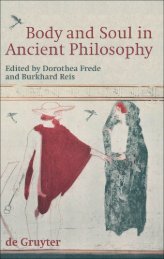[Niall_Livingstone]_A_Commentary_on_Isocrates'_Busiris
[Niall_Livingstone]_A_Commentary_on_Isocrates'_Busiris
[Niall_Livingstone]_A_Commentary_on_Isocrates'_Busiris
You also want an ePaper? Increase the reach of your titles
YUMPU automatically turns print PDFs into web optimized ePapers that Google loves.
30 INTRODUCTION<strong>Busiris</strong> does not add very much to our knowledge of Polycrates'interests. He is given the stereotypical characteristics of a sophist:mercenary motives, arrogant boastfulness, the claim to make people'better'. 67 At <strong>Busiris</strong> 8 he is said to have taken an interest in genealogies(Genealogy is a prime topic ofencomium (see note <strong>on</strong> § 10and Isocrates may just meanthat he developed it with more than average enthusiasm; or he mayhave made use of arguments from heroic chr<strong>on</strong>ology, as Isocrateshimself does in <strong>Busiris</strong> 8. Alternatively he may have had an independentinterest in the genealogy of the heroes, as did Hippias of Elis. 68Di<strong>on</strong>ysius of Halicarnassus classes Polycrates, al<strong>on</strong>g with Antiph<strong>on</strong>,Thrasymachus, Critias and Zoilus, am<strong>on</strong>g the teachers of practicalrhetoric. 69 He criticises Polycrates' style severely, in terms which implyoverblown verbosity and a tasteless use of too many extravagantfigures and poeticisms. 70 Di<strong>on</strong>ysius menti<strong>on</strong>s 'real' ( speeches:it is not clear exactly what this means, but the word suggests workswritten for actual use in court or assembly. 71 No other source menti<strong>on</strong>sany such works. For ancient writers <strong>on</strong> rhetoric, he was clearlythe writer of par excellence. 72 His predilecti<strong>on</strong>s seem to havebeen inherited by his pupil Zoilus, who, besides his famous worksAgainst Homer's Poetry and Against Plato, is said to have written an67 Cf. Bus. 1 4 42 . . ., with notead loc. in each case.68 Cf. Plato Hippias maior 285d.69(Isaeus 20).70 II(Isaeus 20): <strong>on</strong> Di<strong>on</strong>ysius' criticalterms, see Geigenmiiller 1908 pp. 110 f., 114. We may recall the encomiumdescribed by Demetrius, with its 'antitheses, metaphors, and every epideictic figure'.71The adjective occurring most often in the phrasenormally implies a real forensic or political situati<strong>on</strong> (Geigenmuller 1908 p. 60). InIsaeus 20 Polycrates comes between Antiph<strong>on</strong> and Thrasymachus in the discussi<strong>on</strong>;Di<strong>on</strong>ysius states explicitly that Antiph<strong>on</strong> did not engage in dicanic or symbouleuticc<strong>on</strong>tests, and that Thrasymachus left no lawcourt speeches. Hence the absenceof any such statement about Polycrates, together with the reference tostr<strong>on</strong>glysuggests that Di<strong>on</strong>ysius did know of some practical speeches ascribedto him—unless it is simply that he did not recognise, or chose to ignore, the ficti<strong>on</strong>alcharacter of the Accusati<strong>on</strong> of Socrates: compare his criticism of the speech in Plato'sMenexenus as though it were a real (Demosthenes 23-30).72Demetrius understands his purpose and excuses his bombastic style:(On Style 120). Cf.Alexander RG III.3, Quintilian II. 17.4.


![[Niall_Livingstone]_A_Commentary_on_Isocrates'_Busiris](https://img.yumpu.com/51449110/43/500x640/niall-livingstone-a-commentary-on-isocrates-busiris.jpg)




![[Richard_Sorabji]_Self__Ancient_and_Modern_Insigh(BookFi.org)](https://img.yumpu.com/30857691/1/174x260/richard-sorabji-self-ancient-and-modern-insighbookfiorg.jpg?quality=85)





